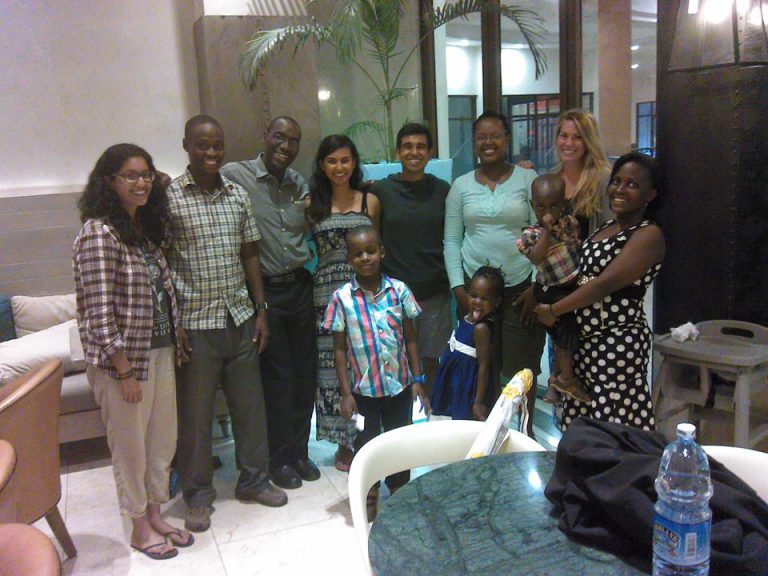Written by Kiran Rikhraj, MD 2019
“What does it mean to engage in a Global Health experience?” This question was often posed to my 3 teammates and I during training sessions prior to our 5-week research trip to Uganda. Our answers often consisted of phrases such as “working with local health authorities, engaging with community members and learning about their culture.” While these ideas are essential components of working in Global Health, we had little idea at the time of how to put these concepts into practice. Moreover, we could never have anticipated how the venture would touch our lives and how the themes of “unpredictability” and “adaptability” would shape our journey.
We were based in the rural town of Nakaseke, which is approximately an hour’s drive from the capital city of Kampala. Situated in the lush greenery of central Uganda, Nakaseke is home to approximately 2000 people, a majority of whom are farmers. Our work involved collaborating with the locally founded and based African Community Center for Social Sustainability (ACCESS). Dr Robert Kalyesubula, the founder and director, started the center with the goal of providing health services, education and empowerment for community members. The ACCESS compound houses a Family Planning Clinic, Pharmacy and a Nursing school. As requested by Dr Robert, our research focused on evaluating the two Family Planning models employed by ACCESS. The first model involved community members travelling to the clinic and receiving services offered by ACCESS staff while the second model involved Community Health Workers (CHW) who visited people in the community in order to deliver Family Planning services. We conducted verbal interviews and focus groups with clinic and CHW clients in order to compare client satisfaction and the quality of services provided. Since we had worked with the ACCESS team to specify the details of our research protocol prior to our arrival, we naively assumed that most aspects would go according to plan. We were thus thrown off balance when unforeseen circumstances, such as a lack of adequate translators, forced us to change almost everything ranging from our target number to our interview process. At times, it would seem as though even the weather was working against us; torrential downpours would leave Nakaseke as silent as a grave and we would trudge back to our rooms with the knowledge that no interviews were to be held that day. “Unpredictable” – a concept that can only truly be grasped when you are faced with an ever changing series of events that you feel powerless to control. After failed attempts to combat the unpredictable nature of the work we were doing, we learned that instead the best approach was to adapt to the circumstances we were faced with.
Scientists often tout adaptability as being a key trait that allows human beings to successfully navigate their environment yet we never expected this concept to apply so closely to our lives. As with travelling to any foreign land, we had to adjust to the time zone, climate, infrastructure and lifestyle of the local population. Sleeping under mosquito nets, turning to our headlamps during power outages and waking up to the sound of goats bleating outside our door became part of our daily routine. Previously non-existent allergies now manifested themselves with a vengeance and we found ourselves frequently battling digestive upsets despite travel vaccinations. In spite of these misfortunes, we surprised ourselves at how quickly we accepted and managed our situation. For example, the lack of an insect-free washroom could have generated a tirade of complaints. Instead, we joked around about what new pests we would find that day and quietly accepted that the washroom would be something we would have to live with. Perhaps the reason why we adapted so readily was due to the inspirational people around us. We were living next to the ACCESS manager, Ronald, along with his wife, Winnie, and 2 year old daughter, Rona. Winnie became one of our closest friends in Nakaseke; she would never fail to greet us with an array of delicious food served with stories about her life and information about Ugandan culture. Born in Kampala, Winnie was enrolled in the engineering program at university until she married Ronald. When Ronald was posted in Nakaseke, she had to give up her career in order to move to the town with him. Her current roles consisted of maintaining the household while raising their daughter. Although she was unhappy as this was not what she had envisioned for herself, she had made peace with her circumstances and was planning to return to engineering when Rona was older. Her tenacity and optimism resonated throughout the community. Whenever we walked into town, we saw individuals making do with what they had; strips of cloth were fashioned into baby carriers and old tyres became toys for children. It has become almost cliché to state that you realize how privileged you are after travelling to a developing country. But to those who have had such experiences, there is no other way to express the deep seated gratitude one feels when one returns to the security and comforts of home.
After our return to Vancouver, we began analyzing the data we had gathered and we are currently in the process of presenting it to the ACCESS team. Our project gives ACCESS the ability to evaluate its services in order to better provide for the community in a sustainable manner. Carrying out global research can be intimidating; it is unpredictable, mentally challenging and sometimes emotionally draining. However, it also equipped us with the ability to adapt in order to make the best of our circumstances. We left Uganda with 2 treasures: the lessons we learned and the people we met. We hope to use these as inspiration for our future work as health care providers in both local and global settings.
